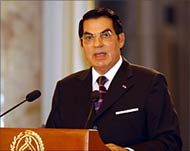Tunisian lawyer drops hunger strike
Tunisia’s leading human rights activist has abandoned a two-month hunger strike to protest against government harassment.

Lawyer Radhia Nasraoui, 50, wept on Wednesday as she said she could not go on because her health was deteriorating.
Nasraoui said doctors had urged her to stop the fast begun on 15 October to protest against what she said was systematic government harassment, beatings and police surveillance.
“Following my doctors’ advice and of the people around me, I am ending my hunger strike now,” a sobbing Nasraoui said in a very feeble voice.
Nasraoui claims her country has become a police state under President Zain al-Abidin Bin Ali, and has vowed to give her life in the fight against torture, arbitrary arrests and unfair imprisonment.
Intolerable surveillance
The wife of opposition leader Hamma Hammami, Nasraoui is demanding an end to police surveillance of her office and home.
She has said permanent police shadowing had made daily life impossible, and that “terror” had been exerted on her family and friends.
The lawyer has also accused the authorities of wanting to “reduce her to silence”, and isolate her because of her human rights advocacy and denunciation of torture.
Nasraoui staged a month-long hunger strike last year to demand the release of her husband, sentenced in absentia in 1999, for membership of the banned Tunisian Communist Workers Party.
 |
|
Bin Ali is accused of running a |
‘Groundless allegations’
Zain al-Abidin Bin Ali has ruled the small North African country since 1987, and was last re-elected in 1999 with 99.44% of the vote.
The government says Nasraoui’s allegations are groundless and that she has been allowed to practise freely as a lawyer.
Bin Ali is credited with maintaining social stability and relative economic prosperity.
However, opposition leaders and rights activists at home and abroad regularly accuse the government of suppressing dissent and routinely violating human rights.
Hard-hitting report
In its 2003 human rights report on Tunisia, Amnesty International condemned the country’s rights record.
Amnesty said hundreds of political prisoners, most of them prisoners of conscience, remained in prison. Many had been held for more than a decade after unfair trials.
Repression of human rights defenders and civil society activists continued, and the authorities further clamped down on freedom of communication.
Torture and ill-treatment were reported in police stations, state security buildings and prisons. Those responsible were generally not brought to justice.